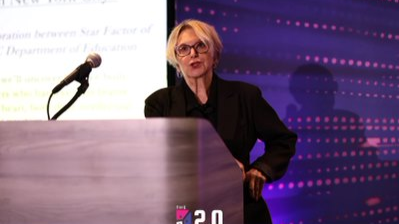I recently had the honor of presenting a keynote and participating in a panel at Education 2.0 and CXO 2.0, where global leaders in education and business gathered to discuss the future of leadership.
The conversations were rich, but one truth stood out: We are at a turning point in leadership development.
For too long, we’ve treated emotional intelligence as an afterthought—something to develop once leaders are already struggling. But the reality is EI isn’t just a skill for executives and school administrators. It’s the foundation of effective leadership at every level, from students to superintendents.
At Star Factor Coaching, we’ve seen firsthand how integrating mentorship, coaching, and emotional intelligence transforms leadership—not just for those in power today, but for the next generation who will redefine what leadership looks like.
Why Leadership Training Must Start Earlier
Too often, we focus on leadership development only when someone steps into an official role.
- Teachers receive PD on instructional strategies, but not on how to regulate emotions in high-stress classrooms.
- Principals are trained in school operations, but not in how to manage difficult conversations with staff, parents, or students.
- College students take courses in management, but few programs teach them how to lead with self-awareness and emotional agility.
We have it backward. Emotional intelligence isn’t something leaders should develop once they’re overwhelmed—it should be embedded into education from the start.
This is especially critical now, as we see an emerging generation of leaders who think differently about leadership.
Gen Z and the Future of Leadership
During my panel discussion, a key theme emerged: The next generation of leaders… Gen Z expects a different kind of leadership.
- They don’t just want authority—they want authenticity.
- They value psychological safety and belonging more than hierarchy.
- They’re not willing to endure toxic leadership in the name of career advancement.
This means our current approach to leadership development must evolve.
If we want to prepare future leaders, we need to move beyond traditional leadership models and embrace coaching, mentorship, and emotional intelligence as the new standard.
Why Coaching Works When Traditional Leadership Training Fails
In my work at Star Factor Coaching, I’ve seen a clear difference between leaders who attend training sessions and those who engage in real coaching.
Traditional leadership training teaches strategies. Coaching transforms behavior.
At Star Factor Coaching, we use a psychoeducational approach that combines:
- Mentorship, so leaders learn from real-life experience, not just theory.
- Coaching, so they develop self-awareness and emotional regulation.
- Emotional intelligence training, so they don’t just react to stress—they lead through it.
This isn’t just about creating more effective school leaders. It’s about reshaping leadership from the ground up—so that emotional intelligence is as fundamental as technical expertise.
The Call to Action: What School Leaders Must Do Next
If we want to build strong schools, resilient leaders, and thriving students, we need to rethink how we approach leadership development.
That starts with asking hard questions:
- Are we preparing leaders for the emotional reality of leadership—or just its logistics?
- Are we integrating emotional intelligence into education at all levels?
- Are we equipping future leaders with the tools they need to lead in a rapidly changing world?
At Star Factor Coaching, we’re committed to this mission.
And if you want to understand the research behind why emotional intelligence matters in leadership, read Emotional Intelligence for School Leaders.
Because the future of leadership isn’t just about intelligence. It’s about self-awareness, resilience, and the ability to lead with emotional clarity.


